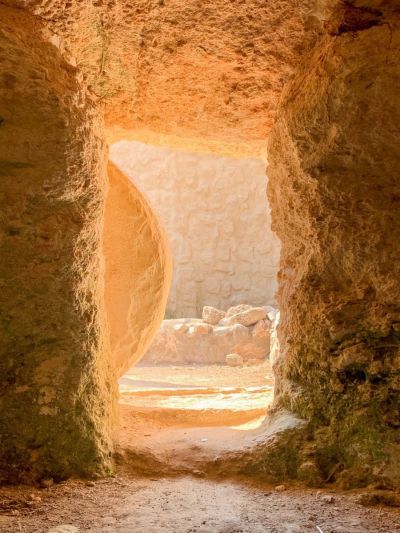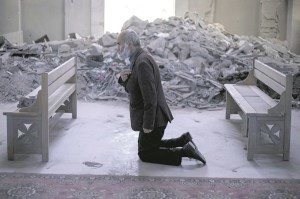The morning that changed the world

Death and mayhem and bad news are nearly all we hear these days, or so it seems. It’s easy to lose hope.
An acquaintance emailed me recently: “I am completely broken by witnessing my beloved America commit suicide right before my eyes; it is painful to watch, as an old man who remembers her when she was still morally sane.”
Is there any good news anywhere? Yes. It is not new news, but it’s a message that can never be proclaimed too often. My acquaintance added: “If I didn't have an eternal hope that this is not how it ends, I would be in complete despair.”
An “eternal hope”? How can we have such a thing in this world? The answer is “because Jesus walked out of His own tomb 2,000 years ago.”
The original Easter morning changed the world. Your birth year is in direct reference to the birth year of Jesus Christ. But we wouldn’t know anything about the itinerant rabbi, Jesus of Nazareth, had He not walked out of His own tomb. He would be a footnote to history.
Meanwhile, the Western world has experienced a crisis of faith for more than a century now. For example, in 1841, an anti-Christian philosopher in Germany, Ludwig Feuerbach, wrote a skeptical book entitled, The Essence of Christianity, in which he said, “Religion is the dream of the human mind.” Amazingly, he argued that the Christian faith was essentially a “false divine mandate for their personal advancement.” (The exact wording here comes from Christian apologist Alister McGrath of Oxford in a paraphrase summarizing Fauerbach.)
Anybody who knows anything about the birth of the Christian faith knows how insane that assertion is.
“Personal advancement”? Tell that to the early Christians, who experienced unparalleled persecution for their beliefs. Nero had many Christians covered over in tar and pitch and hoisted up by ropes and burned alive — to light his garden parties.
“Personal advancement”? Early Christians were fed to the lions to the amusement of the crowds.
We see beautiful statues in churches around the world dedicated to the 12 apostles. Some people would have us think that the apostles concocted some conspiracy to sell to the world that Jesus is Lord for the sake of their own glory and power.
But the reality is, these men, salt of the earth types, were the first skeptics of Christ’s resurrection. They had to be convinced by His re-appearing to them risen from the dead. Once they were convinced, nothing could stop them from proclaiming Christ crucified and risen from dead, through Whom comes the forgiveness of sins for those who believe.
However, what if they just made up the part about Him rising from the dead? By proclaiming Christ’s resurrection, these disciples faced scourging, torture, and in some cases, crucifixion — the most horrible form of death imaginable.
In the 19th century, when dealing with skeptics of his own age, Scottish theologian Dr. Principal Hill said that if you believe the testimony of the Apostles that Christ rose from the dead, then you can give the most natural account of every part of their conduct, of their conversion, of their steadfastness, of their heroism.
Noted Hill: “But if … you suppose their testimony to be false, inexplicable circumstances of glaring absurdity crowd upon you. You must suppose that 12 men of mean [i.e., average] birth, of no education, living in that humble station which placed ambitious views out of their reach, and far from their thoughts, without any aid from the state, formed the noblest scheme which ever entered into the mind of man, adopted the most daring means of executing that scheme, conducted it with such address as to conceal the imposture under the semblance of simplicity and virtue.”
Hill continues, “You must suppose that men guilty of blasphemy and falsehood, united in an attempt the best contrived, and which has in fact proved the most successful, for making the world virtuous; that they formed this singular enterprise without seeking any advantage to themselves, with an avowed contempt of loss and profit, and with the certain expectation of scorn and persecution; that although conscious of one another’s villainy, none of them ever thought of providing for his own security by disclosing the fraud, but that amidst sufferings the most grievous to flesh and blood they persevered in their conspiracy to cheat the world into piety, honesty, and benevolence.”
Hill concludes, “Truly they who can swallow such suppositions have no title to object to miracles.”
One man and his wife have a reminder at their grave about their hope in Jesus. Chiseled in stone behind the sarcophagi of George and Martha Washington at Mt. Vernon are words based on Jesus’s quote from John 11: “I am the resurrection, and the life: he that believeth in me, though he were dead, yet shall he live.”
We can have hope because Christ is risen indeed.
Jerry Newcombe, D.Min., is the executive director of the Providence Forum, an outreach of D. James Kennedy Ministries, where Jerry also serves as senior producer and an on-air host. He has written/co-written 33 books, including George Washington’s Sacred Fire (with Providence Forum founder Peter Lillback, Ph.D.) and What If Jesus Had Never Been Born? (with D. James Kennedy, Ph.D.). www.djkm.org? @newcombejerry www.jerrynewcombe.com




























